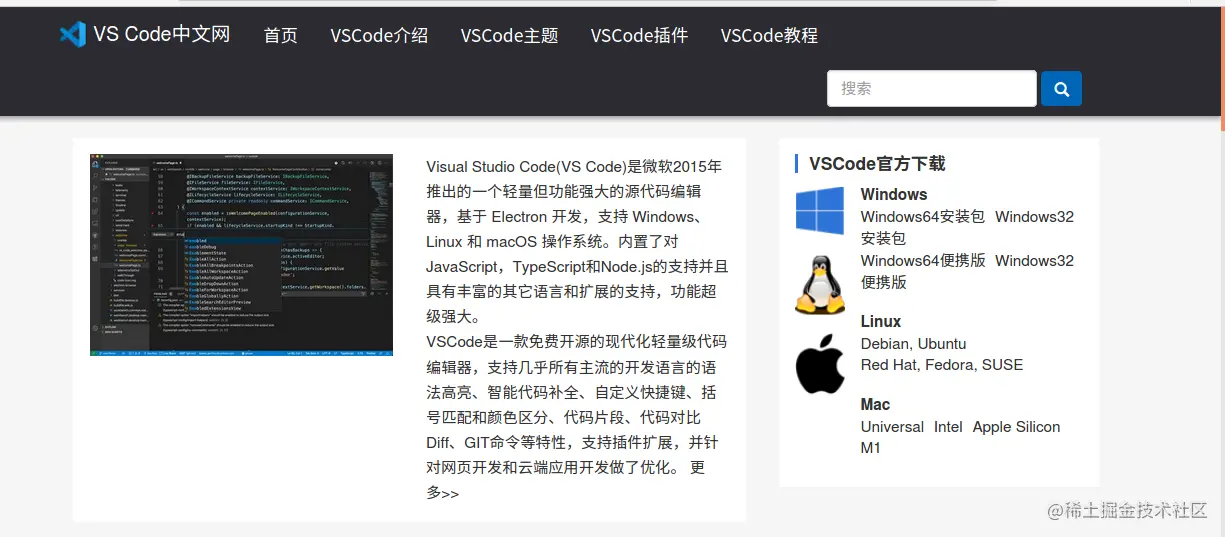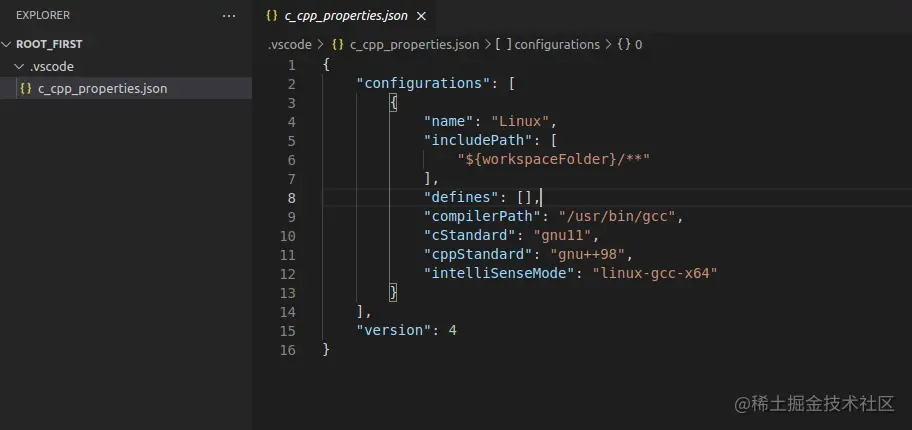Take you step by step to configure Geant4 and Root in VSCode
This article is a VSCode configuration article. It will teach you step by step how to configure and use Geant4 and Root in VSCode. I hope it will be helpful to everyone!

For a long time, I have always preferred Visual Studio as an IDE for C development. From version 08 to the currently commonly used version 19, I have not chosen it for a long time. Changed. Are there any other IDEs to choose from? Of course there are! This article will guide you step by step through VS Code configuration to compile, run, and debug Geant4 and Root. [Recommended learning: "vscode introductory tutorial"]
Development environment configuration
System environment
Virtualization platform: VMware WorkStation 16 Pro

Operating system: Ubuntu 16.04 LTS

Installation
Enter VS Code Official website or 中文网, select the version suitable for the system and download it , here I choose the Linux version.

After the download is completed, it is a brainless installation. The operation is as fierce as a tiger. After the installation is completed, the first time you enter the page is as shown below. Select your favorite theme and what you want. function.

Add C-related plug-ins
Search and add C-related plug-ins on the extension options, including Cmake Compilation tools.

Add Geant4 and Root external dependencies
Before adding dependencies, create a new directory ( I randomly named it Root_First) as a workspace and open this directory through VS Code.
Then show All Command through the Ctrl Shift P key combination, and then select C/C edit configuration

At this time, a hidden file c_cpp_properties.json will be automatically generated and placed in the .vscode directory.

Next we introduce the dependencies of Geant4 and Root by modifying the c_cpp_properties.json file.
{
"configurations": [
{
"name": "Linux",
"browse":{
"path":[
"${workspaceFolder}/src",
"${workspaceFolder}/include",
"/home/ll/root/include",
"/home/ll/geant4.10.04/include/Geant4"
],
"limitSymbolsToIncludedHeaders":true
},
"includePath":[
"${workspaceFolder}/src",
"${workspaceFolder}/include",
"/home/ll/root/include",
"/home/ll/geant4.10.04/include/Geant4"
],
"defines": [],
"compilerPath": "/usr/bin/gcc",
"cStandard": "c11",
"cppStandard": "c++17",
"intelliSenseMode": "linux-gcc-x64"
}
],
"version": 4
}A brief explanation:
- ${workspaceFolder}/src Link src
- ${workspaceFolder}/include Link include
- /home/ll/root/include Link root
- /home/ll/geant4.10.04/include/Geant4 Link geant4
At this point, the configuration of the external link library has been completed, the relevant dependencies will not be marked red and errors will be reported, and you can also use the class object pointer to remind you of some options and syntax checks when calling methods. and other functions.
Friendly reminder: Remember to copy this configuration to the .vscode directory in every working directory in the future to take effect (if there is no .vscode directory , then you might as well create a new one).
For more knowledge about VSCode, please visit: vscode tutorial! !
The above is the detailed content of Take you step by step to configure Geant4 and Root in VSCode. For more information, please follow other related articles on the PHP Chinese website!

Hot AI Tools

Undresser.AI Undress
AI-powered app for creating realistic nude photos

AI Clothes Remover
Online AI tool for removing clothes from photos.

Undress AI Tool
Undress images for free

Clothoff.io
AI clothes remover

Video Face Swap
Swap faces in any video effortlessly with our completely free AI face swap tool!

Hot Article

Hot Tools

Notepad++7.3.1
Easy-to-use and free code editor

SublimeText3 Chinese version
Chinese version, very easy to use

Zend Studio 13.0.1
Powerful PHP integrated development environment

Dreamweaver CS6
Visual web development tools

SublimeText3 Mac version
God-level code editing software (SublimeText3)

Hot Topics
 1669
1669
 14
14
 1428
1428
 52
52
 1329
1329
 25
25
 1273
1273
 29
29
 1256
1256
 24
24
 How to define header files for vscode
Apr 15, 2025 pm 09:09 PM
How to define header files for vscode
Apr 15, 2025 pm 09:09 PM
How to define header files using Visual Studio Code? Create a header file and declare symbols in the header file using the .h or .hpp suffix name (such as classes, functions, variables) Compile the program using the #include directive to include the header file in the source file. The header file will be included and the declared symbols are available.
 What computer configuration is required for vscode
Apr 15, 2025 pm 09:48 PM
What computer configuration is required for vscode
Apr 15, 2025 pm 09:48 PM
VS Code system requirements: Operating system: Windows 10 and above, macOS 10.12 and above, Linux distribution processor: minimum 1.6 GHz, recommended 2.0 GHz and above memory: minimum 512 MB, recommended 4 GB and above storage space: minimum 250 MB, recommended 1 GB and above other requirements: stable network connection, Xorg/Wayland (Linux)
 How to solve the problem of vscode Chinese annotations becoming question marks
Apr 15, 2025 pm 11:36 PM
How to solve the problem of vscode Chinese annotations becoming question marks
Apr 15, 2025 pm 11:36 PM
How to solve the problem that Chinese comments in Visual Studio Code become question marks: Check the file encoding and make sure it is "UTF-8 without BOM". Change the font to a font that supports Chinese characters, such as "Song Style" or "Microsoft Yahei". Reinstall the font. Enable Unicode support. Upgrade VSCode, restart the computer, and recreate the source file.
 vscode terminal usage tutorial
Apr 15, 2025 pm 10:09 PM
vscode terminal usage tutorial
Apr 15, 2025 pm 10:09 PM
vscode built-in terminal is a development tool that allows running commands and scripts within the editor to simplify the development process. How to use vscode terminal: Open the terminal with the shortcut key (Ctrl/Cmd). Enter a command or run the script. Use hotkeys (such as Ctrl L to clear the terminal). Change the working directory (such as the cd command). Advanced features include debug mode, automatic code snippet completion, and interactive command history.
 Common commands for vscode terminal
Apr 15, 2025 pm 10:06 PM
Common commands for vscode terminal
Apr 15, 2025 pm 10:06 PM
Common commands for VS Code terminals include: Clear the terminal screen (clear), list the current directory file (ls), change the current working directory (cd), print the current working directory path (pwd), create a new directory (mkdir), delete empty directory (rmdir), create a new file (touch) delete a file or directory (rm), copy a file or directory (cp), move or rename a file or directory (mv) display file content (cat) view file content and scroll (less) view file content only scroll down (more) display the first few lines of the file (head)
 Where to write code in vscode
Apr 15, 2025 pm 09:54 PM
Where to write code in vscode
Apr 15, 2025 pm 09:54 PM
Writing code in Visual Studio Code (VSCode) is simple and easy to use. Just install VSCode, create a project, select a language, create a file, write code, save and run it. The advantages of VSCode include cross-platform, free and open source, powerful features, rich extensions, and lightweight and fast.
 vscode Previous Next Shortcut Key
Apr 15, 2025 pm 10:51 PM
vscode Previous Next Shortcut Key
Apr 15, 2025 pm 10:51 PM
VS Code One-step/Next step shortcut key usage: One-step (backward): Windows/Linux: Ctrl ←; macOS: Cmd ←Next step (forward): Windows/Linux: Ctrl →; macOS: Cmd →
 vscode terminal command cannot be used
Apr 15, 2025 pm 10:03 PM
vscode terminal command cannot be used
Apr 15, 2025 pm 10:03 PM
Causes and solutions for the VS Code terminal commands not available: The necessary tools are not installed (Windows: WSL; macOS: Xcode command line tools) Path configuration is wrong (add executable files to PATH environment variables) Permission issues (run VS Code as administrator) Firewall or proxy restrictions (check settings, unrestrictions) Terminal settings are incorrect (enable use of external terminals) VS Code installation is corrupt (reinstall or update) Terminal configuration is incompatible (try different terminal types or commands) Specific environment variables are missing (set necessary environment variables)





